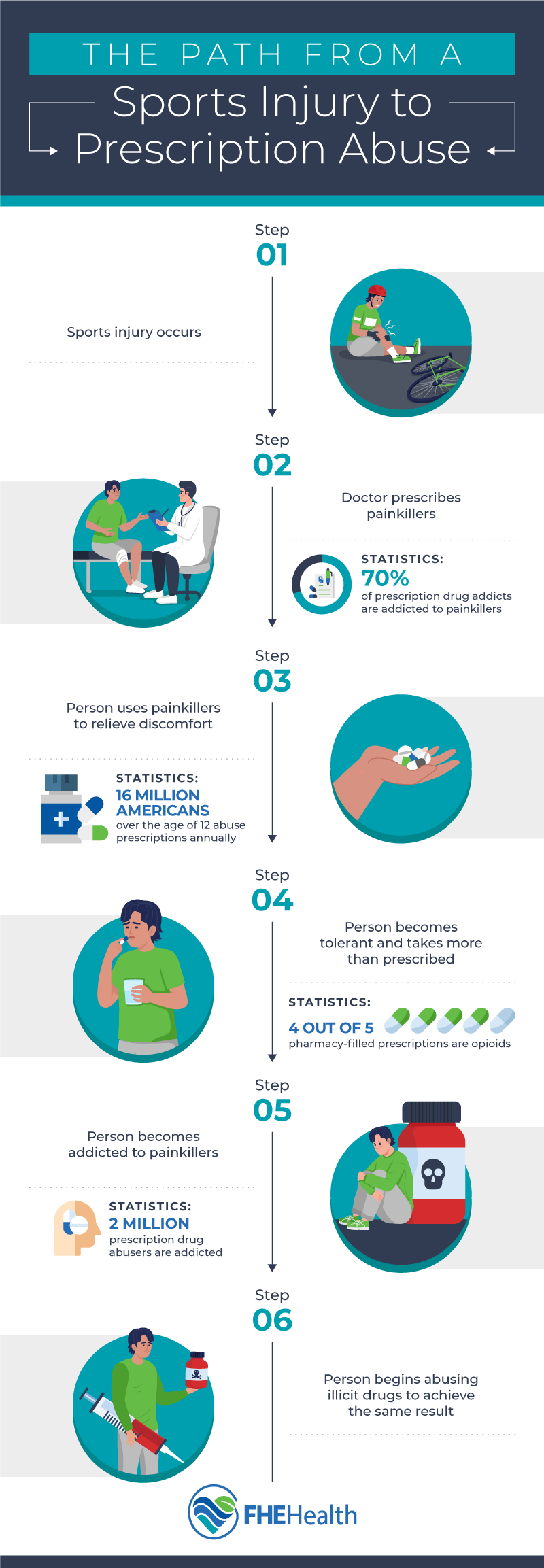
Updated July 20, 2023
Austin Box fatally overdosed on May 19, 2011. A local news station reporting on his death said the toxicology screening later found at least four prescription medications for pain in Box’ system: morphine, hydrocodone, oxycodone, and an anti-anxiety medicine.
“There is no question he hid it from us, but we had no idea until he died,” Box’ father told the reporter about his son’s struggle with painkillers.
Box had played football since the age of four and offense and defense as a linebacker in high school, but a string of painful injuries including a ruptured disc proved excruciating and debilitating, both physically and emotionally. So began the path to overdose.
Stories like Box’ are not rare in the world of sports. Injuries are commonplace irregardless of the sport, and with them—pain, a natural side effect. It can range from mild to severe, and its occurrence might be finite or prove to be long-term or even chronic.
That makes successful pain management a legitimate and important need, especially when many of the medications that are most effective at controlling pain (a case in point, opioids) are also highly addictive. In the absence of safer and equally effective pharmacological solutions, many may turn to an opioid painkiller as a last resort, only to get hooked. How, more specifically, does a pain problem become a prescription painkiller problem? We’ll chart that path, starting with some context….

Prescription Painkillers and Misuse
The recent prescription painkiller epidemic continues to be a tragedy of epic proportions that states and the medical community are struggling to deal with. Since pain medications like opioids are the most commonly abused drugs, they are associated with the highest addiction rates. Although healthcare providers are supposed to carefully monitor patients taking pain narcotics, the risk for abuse continues nevertheless.
The prescription drug epidemic has resulted in immense loss of life. Between 1999 and 2018, more than 450,000 lost their lives to a drug overdose. The lion’s share of these deaths is related to opioid drugs.
Meanwhile, someone who suffers a serious sports injury may need to rely on these medications for a considerable length of time. That puts them at higher risk of misuse and dependence.
The Slippery Slope
Prescription pain medications are highly effective for treatment of pain. That’s the good news. They work! The bad news is that there is a catch; these drugs come with a high risk of tolerance. What does this mean? It means that when someone takes a narcotic like hydrocodone (or Vicodin) for a week or two or even three, they will begin to develop a tolerance to their dose. This means that the drug won’t relieve their pain as well or for as long because their body has become accustomed to the dose.
The pain from the sports injury can be intense and last for much longer than a few weeks. So, it often happens that patients, quite innocently, take a pain pill a bit sooner than they should. They might take a little extra medication when their pain really flares up. And that is literally all it takes to pave the way to addiction.
As that next dose is increased and the body develops a tolerance to it, too, the same thing will occur. The individual will increase their dose a bit more. This is how dependence and addiction form.
Once addiction sets in, it changes the chemistry of the brain. This condition becomes quite complex, involving dependencies that are physical, psychological, and behavioral. Few people can manage a substance addiction without professional treatment that targets each aspect of the addiction.
Addressing Underlying Issues
Pain is not the only problem when it comes to the development of an addiction after a sports injury. While healing, individuals can become bored or experience mental health issues. It can be depressing to experience chronic pain. Patients can become anxious about their condition and their ability to play sports again or, in extreme cases, to function normally again. Those mental health issues cannot be overlooked.
Mental health plays a big role in the recovery process. If someone is depressed, they may become more at risk for self medicating with their pain medication, which will, given its effects, dull mental pain as well as physical pain. Pain medications will dull emotional stress, and that can become a trigger to abuse them. Keep in mind that about a third of people with a substance abuse problem also have a mental health disorder like depression or anxiety. The pressure to heal, to get back to playing, the emotional tumult–these things can result in serious prescription drug abuse.
Alternative Pain Management and Support
Today, many healthcare providers offer alternative methods for alleviating and managing the pain from sports injuries. If you are recovering from an injury, talk to your doctor about these methods. Physical therapy, restorative yoga, or alternative (non-addictive) medications—maybe a combination of these interventions—may provide effective pain management. It’s well worth looking into, especially if your pain is likely to be long term.






